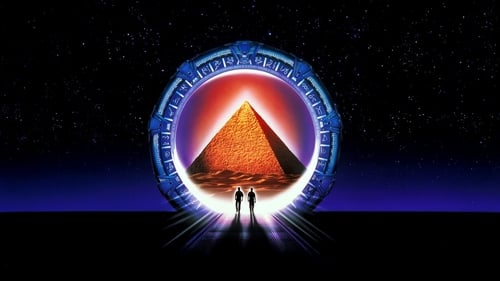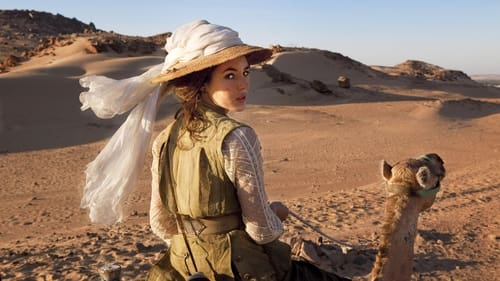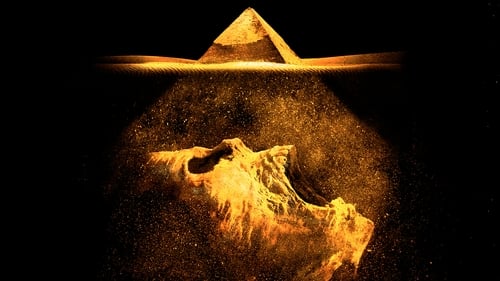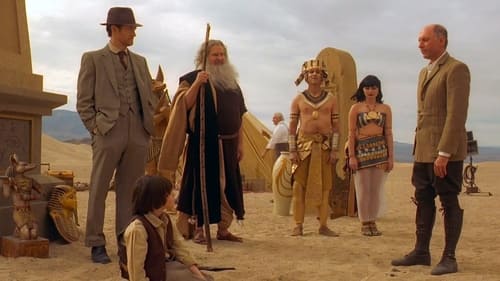The Search for Tutankhamun (2005)
Género : Documental, Historia
Tiempo de ejecución : 0M
Director : Ferdinand Fairfax
Sinopsis
Howard Carter hunts for the tomb of the boy king Tutankhamun.

Un coronel y un científico, movidos por distintos intereses, investigan el misterioso hallazgo en unas excavaciones de un extraño artefacto al que llaman "Puerta de las Estrellas". Acompañados de un equipo de reconocimiento, atraviesan la Puerta y son transportados a un lejano planeta.

En 1912, mientras la intrépida periodista Adèle Blanc-Sec viaja a Egipto para enfrentarse a un grupo de momias, París se ve acosado por un misterioso pterodáctilo de 136 millones de años de antigüedad. Basada en un personaje de cómic del dibujante Jacques Tardi.

Un equipo de arqueólogos estadounidenses descubre una antigua pirámide en medio del desierto egipcio. Se adentran en ella y al poco tiempo se encontrarán perdidos en sus oscuras catacumbas que parecen no tener fin. Mientras tratan de encontrar una salida, poco a poco comienzan a desesperarse pensando que no volverán a ver la luz del día. Además, no tardarán en darse cuenta que algo les persigue.

En 1923, Cecil B. DeMille terminó el rodaje de "Los diez mandamientos". Durante el rodaje, ocurrieron extraños sucesos y, terminado el trabajo, el plató quedó sepultado bajo las dunas. Algunos años después, las tareas de rescate de los restos de los decorados, despiertan a un espíritu egipcio. A partir de ese momento, algunos miembros del equipo empiezan a morir.

As part of a high-tech forensic probe into the demise of Egyptian Pharaoh Tutankhamun, scientists use X-rays and CT scans as they attempt to reach a conclusion about just how this famed king died. In addition, they explore the mysterious curse on explorers linked to Tut's tomb excavation.

Documental que analiza la historia antigua con métodos del siglo XXI para reconstruir de forma definitiva la figura del faraón Tutankamon. Un análisis que reúne los más recientes descubrimientos de arqueólogos, químicos, geólogos, microbiólogos y egiptólogos.

Professor Joann Fletcher explores what it was like to be a woman of power in ancient Egypt. Through a wealth of spectacular buildings, personal artefacts and amazing tombs, Joann brings to life four of ancient Egypt's most powerful female rulers and discovers the remarkable influence wielded by women, whose power and freedom was unique in the ancient world. Throughout Egypt's history, women held the title of pharaoh no fewer than 15 times, and many other women played key roles in running the state and shaping every aspect of life. Joann Fletcher puts these influential women back at the heart of our understanding, revealing the other half of ancient Egypt.

A century after the world’s most exciting archaeological find - the tomb of Tutankhamun - we can witness the dramatic scenes of its discovery and marvel at its extraordinary treasures exactly as they were then, in colour.

Revolucionaron el Antiguo Egipto hace más de 3.000 años. Nefertiti, “la belleza ha llegado” y su marido, el faraón Akenatón, removieron los fundamentos de la antigua sociedad egipcia y reinventaron toda una civilización. Se deshicieron del antiguo gobierno, la religión y la capital, e incluso sustituyeron a los antiguos dioses. Y, tras la convulsión, desaparecieron junto a toda su familia. ¿Qué sucedió realmente? Hace décadas que el debate sigue abierto. National Geographic se adentra en el Valle de los Reyes mediante las tecnologías más avanzadas y el uso de tomografías computarizadas para proseguir la búsqueda de aquella familia real rodeada de misterio. Una familia especialmente célebre gracias a un niño, con toda posibilidad hijo de Akenatón, que llegaría a gobernar Egipto: el faraón Tutankamón.

La vida aventurera de Natacha Rambova (1897-1966), una artista estadounidense, nacida Winifred Kimball Shaughnessy, que se reencarnó innumerables veces: falsa bailarina rusa, actriz de cine mudo, escenógrafa y diseñadora de vestuario, escritora, espiritista, egiptóloga, viajera infatigable, misteriosa y curiosa; una maravillosa mujer del siglo XX que creó el mito de Rodolfo Valentino.


For 45 centuries, the Great Sphinx has cast its enigmatic gaze over Egypt's Giza Plateau. The biggest and oldest statue in a land of colossal ancient monuments, its scale is staggering: The mighty head towers as tall as the White House, while its body is nearly the length of a football field. This strange half-human, half-lion image has inspired countless fantastic theories about its origins. How was it built, and who or what does it represent? Surprisingly, the scribes of the period when it was built—during Egypt's Old Kingdom—passed over it in silence. Adding to the mystery, archeologists found that its creators abruptly discarded their tools and abandoned the Sphinx when it was nearly complete. Searching for clues, NOVA's expert team of archeologists, including Mark Lehner, director of Ancient Egypt Research Associates, carries out eye-opening experiments.

The cosmos of the incurable Margarethe. Her journey through the mysteries of the Egyptian underworld. Will she be coming forth by day? Film in two parts by Carsten Frank.

Berlin’s Museum Island, the cultural center of the German capital on the Spree river, houses a large number of art pieces from all over the globe, from the Stone Age to the present day. A walk through their great institutions to marvel at their masterpieces.

Almost 100 years after the discovery of King's Tut's Tomb, it is time to tell the story in a new light. Using 2D and 3D imagery to reconstruct the tomb, the mummy, the funerary objects and the topography of the famous valley of the Kings.

Howard Carter hunts for the tomb of the boy king Tutankhamun.

Imperio Romano, siglo II d.C. Marco Aurelio (160-181), el emperador filósofo, fue el último gobernante de la Edad de Oro romana. Muy a su pesar, tuvo que luchar contra diversos pueblos para defender las fronteras del Imperio. En política interior, su sueño era restaurar las instituciones republicanas, razón por la cual nombró sucesor a su protegido Livio, en detrimento de su ambicioso y corrupto hijo Cómodo. Pero éste no aceptó la decisión de su padre y se apoderó del trono.














